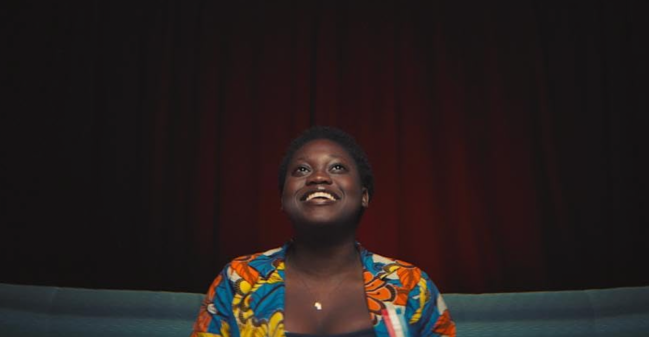What does Oprah do, Josh Gadand Justice Ketanji Brown Jackson all have in common? The answer to this pub question for the ages is that each of them competed in the National Speech and Debate Tournament. Since its founding in 1931, the world’s largest academic competition has brought together thousands upon thousands of middle and high school students to discuss current events. What matters, though, are the stories each competitor brings, the unique, personal anecdotes that imbue each speech with a humanity that is too often lost behind generic newspaper headlines.
in “Speak,” directors Jennifer Tiexiera and Guy Mossman follow five such individuals on their journey to the championships, five very different American teenagers who each juggle this pressure with their own distinct wants and needs over the course of a year. Sudan-born Mfaz Mohamed Ali (17) organically practices public speaking daily through TikTok posts made to her 3.3 million followers. “Passion is the key to oratory,” says Mfaz, and it rings true in every word of her earnest delivery, whether she’s sharing a candid account of shame she’s felt or arguing for a more compassionate representation of Muslims in today’s media.
Another promising competitor, Esther Oyetunji (17), has actually won twice before, so all eyes are on this American-born daughter of a pastor from Nigeria who could make history if she wins again for a third time. Her focus this year is on how politicians use “protect the kids” rhetoric to stay in power, all while ignoring actual problems affecting America’s youth like school shootings. Esther’s trainer says her “superpower” is “genuine compassion and love for what she’s talking about,” which, while certainly accurate, also applies to the rest we follow here, including Noor Garoui (17), who advocates for her disabled younger brother, Sam Schaefer (16), who fights against the straight white cis-majority gun nostalgia, and Noah Chao-Detiveaux (17), who demands dignity for people who die by suicide like his mother did a few years earlier.
All heavy subjects in their own way, each tug at our heartstrings with great force, whether through tears or righteous anger. But Tiexiera and Mossman don’t just rely on this to make “Speak” sing. Otherwise, it film would just be a series of speeches, similar to sitting in the NSDA audience during one of the tournaments. Instead, the pair get up close and personal with their five subjects, balancing the gravity of their speeches and the social problems they face with moments of levity and everyday life in their family home.
Whether they’re raising pigs, going to church, or choosing their outfit for a Taylor Swift concert, the kids at the heart of this documentary are still kids, and “Speak” doesn’t shy away from this or overlook why it’s important. In fact, it’s in these moments where the film often works best, juxtaposing just how impressive and mature each of their speeches is with the mundanity of their teenage reality. Remember, as grown-up as they sound in front of the judges, these contestants are also kids who get butterflies at prom or snap at their parents when the tournament gets a little too much.
Documentaries like this often live or die on the likability of the subject, and “Speak” largely succeeds on that front, even if this balance between the ordinary and the all-but-ordinary pressures they face doesn’t quite flow at times. There’s a lot going on, including important campaigning (“If we don’t do well here, we don’t get to advocate anymore”) plus scholarship money they need to secure their future, so it’s easy to see why they They are so driven and even use coaches to develop their oratory skills. In that respect, “Speak” is reminiscent of sports documentaries such as “Hoop Dreams” as well as competition-based features such as the somewhat similar classic document “Spellbound”. “If we define sport as competition, then speech is the ultimate sport,” it says at one point – but the film itself doesn’t quite have a grasp on how to effectively weave in the competitive passage without losing momentum.
The usual beats of victory and defeat are included, yes, but aside from a painful breakdown (plus a few outbursts from Noah), “Speak” doesn’t have the kind of momentum that traditionally drives “sports” docs in this vein. Some stages of the competition fade away faster than others and key results are often only mentioned in passing without the important reaction scenes you’d expect. The idea, of course, is to focus on the kids and their message rather than who wins or loses, but this is the Super Bowl for public speaking and a little extra, much-needed excitement could have easily been wrested from it without detracting from it. from the core of the film’s message.
But that message still shines through thanks to the teenagers themselves, all scheming in their own way. Each could arguably have been the sole focus of a documentary without moving back and forth between the others, which speaks to the charisma that has helped each of them make it this far in the first place. It’s almost to the film’s detriment as well because just when you’re keen to learn more about one of them, the focus shifts again, making for a somewhat shallower experience at times. The advantage of this approach, however, is how threads begin to form between each subject as they are all united by a desire to speak out and make a difference by giving voice to their own marginalized experiences, and by extension, others similar to them. Public speaking, even when it’s this competitive and cut-throat, gives them a space of belonging, a place where teenagers can feel included and have their ideas validated in a more grown-up and respected space.
The personal growth is as important as the speeches themselves, although the two are inevitably intertwined. Each time Noah tells his story to a new group of strangers and relives his mother’s death over and over again, he also comes to understand his father better in the wake of this tragedy. Another story about a mother’s cookies is also deeply moving, and that’s before we even hear most of the speeches in their entirety. That’s saved for the end, understandably, which is where “Speak” manifests its true power. Yet after the credits rolled, I was left with a nagging feeling that these individual speeches still hold said power more than the actual film, which doesn’t always quite have a grasp on how to harness the full potential of what these teenagers have to say .
Still, at this point in history, just seeing young people care is inspiring in its own way. It is important that storytellers like those here continue to strive for a platform and give voice to the marginalized whose own stories are so often drowned in an endless sea of media chatter. “Speak” does just that, although the film itself could have benefited from a clearer, stronger voice of its own.
Grade: B-
“Speak” premiered in 2025 Sundance Film festival. It is currently seeking distribution in the United States.
Want to keep you updated on IndieWire’s film reviews and critical thoughts? Subscribe here to our newly launched newsletter, In Review by David Ehrlich, where our chief film critic and chief reviews editor gathers the best new reviews and streaming picks along with some exclusive musings—all available only to subscribers.







